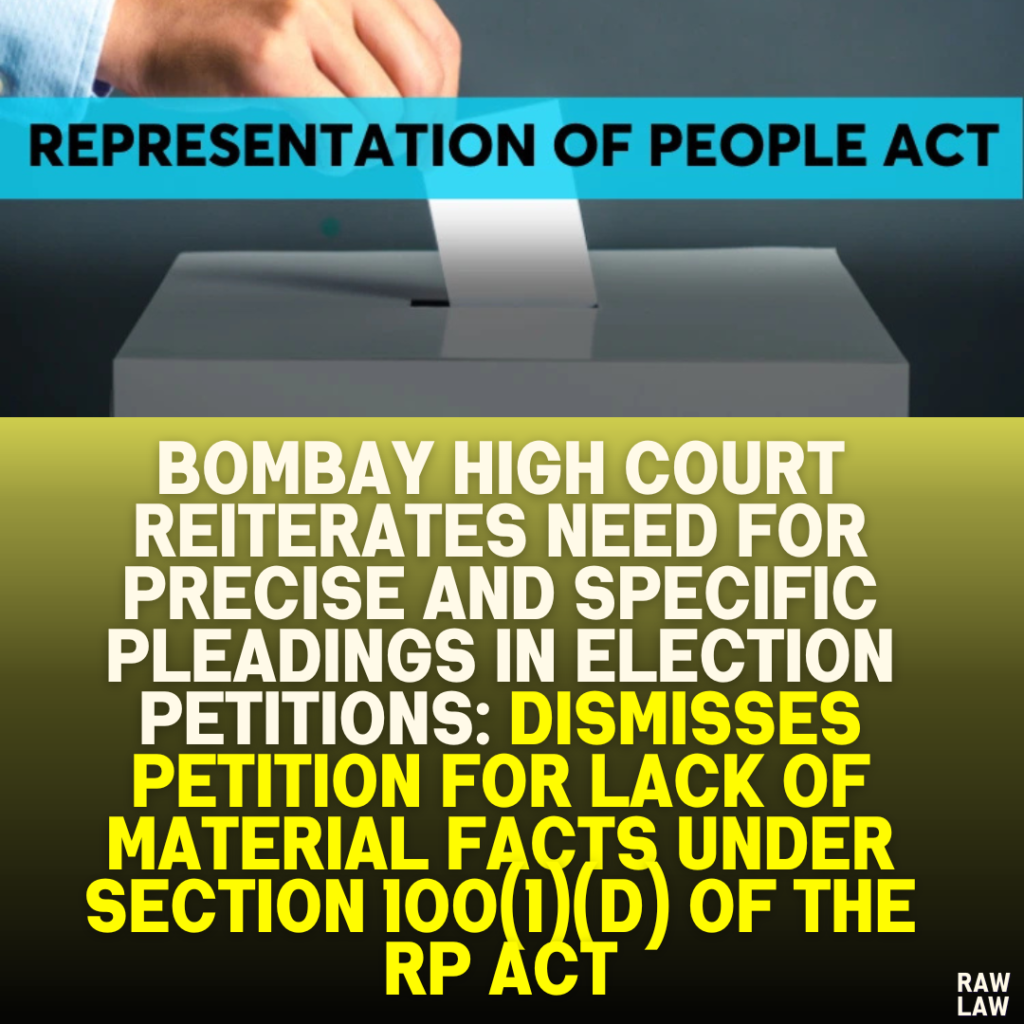Court’s Decision:
The Bombay High Court dismissed the election petition filed under Section 100(1)(d)(iii) and (iv) of the Representation of the People Act, 1951 (RP Act), holding that the petition did not meet the statutory requirement of including a concise statement of material facts to demonstrate how the alleged irregularities materially affected the election outcome. The Court underscored the principle that election petitions are statutory remedies requiring strict compliance with procedural and substantive legal requirements.
Facts:
- The petitioner contested the election to the 18th Lok Sabha from the Mumbai North-West constituency against the respondent, who was declared elected.
- The respondent secured a narrow victory by a margin of 48 votes.
- The petitioner alleged several irregularities during the election process:
- Counting agents of the petitioner were denied access to certain counting tables.
- Form 17-C (Part II) was not provided in numerous polling booths.
- The request for a recount of votes was unreasonably denied after the declaration of results.
- Unauthorized mobile phone usage occurred in the counting area.
- Discrepancies in the count of tendered votes were recorded, which went unaddressed.
- The petitioner sought a declaration that the respondent’s election was void and that the petitioner be declared duly elected.
Issues:
- Did the election petition comply with the statutory requirement under Section 83(1)(a) of the RP Act to include material facts?
- Did the alleged irregularities materially affect the election result, as required under Section 100(1)(d) of the RP Act?
Petitioner’s Arguments:
- Alleged procedural and statutory non-compliances, including discrepancies in tendered votes and denial of recount, amounted to material irregularities.
- Claimed that unauthorized activities, such as mobile phone usage, compromised the integrity of the counting process.
- Argued that the respondent’s election was materially affected by these violations, warranting annulment of the election result.
Respondent’s Arguments:
- The petition did not meet the requirements of Section 83(1)(a), as it failed to include specific and material facts demonstrating a causal link between the alleged irregularities and the election result.
- Argued that the allegations were vague, unsubstantiated, and incapable of proving any material impact on the election result.
- Highlighted that procedural compliance was adequate and the petitioner failed to show how the alleged violations materially affected the respondent’s victory.
Analysis of the Law:
- Statutory Framework:
- Section 100 of the RP Act outlines grounds for declaring an election void. For sub-clauses (iii) and (iv), the petitioner must demonstrate that non-compliance or improper actions materially affected the election result.
- Section 83(1)(a) mandates a concise statement of material facts in the petition.
- Order VII Rule 11 of the CPC allows rejection of petitions that fail to disclose a cause of action.
- Judicial Interpretation:
- Jyoti Basu v. Debi Ghosal: Election petitions are statutory remedies requiring strict compliance with legal provisions.
- Kanimozhi Karunanidhi v. A. Santhana Kumar: Pleadings in election petitions must include specific material facts; failure to do so renders the petition invalid.
- Mairembam Prithviraj v. Pukhrem Sharatchandra Singh: Material facts must establish a clear link between alleged irregularities and the election result.
Precedent Analysis:
- Jyoti Basu v. Debi Ghosal: Established that election petitions are not actions in equity or common law and must adhere strictly to statutory requirements.
- Mairembam Prithviraj v. Pukhrem Sharatchandra Singh: Distinguished between substantive and insubstantial defects, emphasizing the need for material facts.
- Kanimozhi Karunanidhi v. A. Santhana Kumar: Affirmed that petitions lacking material facts are liable to be dismissed.
Court’s Reasoning:
- The Court observed that the petition failed to include material facts showing how the alleged irregularities—such as denial of recount, use of mobile phones, and discrepancies in tendered votes—had a direct impact on the election result.
- Emphasized that vague and generalized allegations do not satisfy the requirements of Section 83(1)(a).
- Rejected the argument that procedural violations alone could invalidate an election without proof of material impact.
Conclusion:
The High Court dismissed the election petition under Order VII Rule 11 of the CPC, finding that it did not meet the statutory requirements under the RP Act. The petition lacked the necessary material facts to demonstrate that the alleged irregularities materially affected the election’s outcome.
Implications:
- Reinforces the principle that election petitions must be based on precise and specific pleadings supported by clear evidence.
- Highlights the judiciary’s role in ensuring procedural and substantive compliance with election laws to uphold democratic principles.
- Sets a high threshold for election disputes, discouraging frivolous or speculative claims.




Pingback: Delhi High Court: Joint Trial Denied for Eight Cheque Dishonour Complaints Under Section 138 NI Act; Each Dishonoured Cheque Constitutes a Separate Cause of Action Requiring Procedural Adherence to Cr.P.C - Raw Law
Pingback: Delhi High Court Dismisses Claims of Medical Negligence Against Doctors; Emphasizes Judicial Deference to Expert Medical Bodies and High Threshold for Proving Negligence - Raw Law
Pingback: Bombay High Court Upholds Maintainability of Suit for Partition and Separate Possession: "Dismissal of Previous Suit Does Not Bar Plaintiffs' Right to Seek New Reliefs" - Raw Law